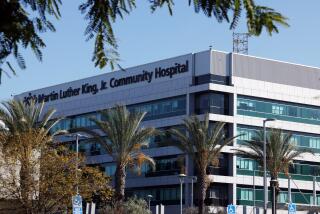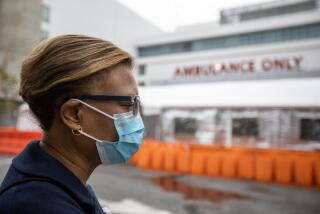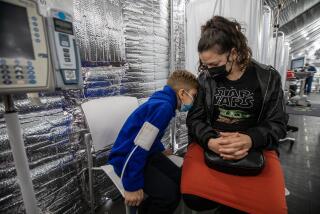A Real-World King/Drew
- Share via
Fixing the Martin Luther King Jr./Drew Medical Center is turning out to be more difficult and costly than Los Angeles County political leaders had anticipated. To make it possible at all, the Board of Supervisors will have to go beyond its $13-million contract with a company that specializes in turning around troubled hospitals. It is going to have to set a realistic goal.
The current model — an academic research institution made up of a county-owned hospital and a private medical school — for years has failed as much as served its community. There is no reason to believe it ever will work. How resistant King/Drew is to change was clarified by the revelation in Wednesday’s Times that three more patients died last month under how-could-this-happen circumstances.
What makes these deaths particularly discouraging is that they echo errors cited over the last year — indeed, over the last two decades — by federal regulators, accreditors, this newspaper and the very consultants who are now running the hospital. King/Drew employees continue to try to conceal mistakes or dodge responsibility for them.
Once again, it took a Times reporter — not anyone at the hospital — to inform a grieving daughter that the county coroner had ruled her mother’s death a medical accident, attributed to complications from the placement of a breathing tube. The dying patient spent her last four hours complaining about pain where the tube had been inserted.
In another of the three deaths, investigators found that an anesthesiologist had failed to respond to a “code blue” emergency. It was not the cause of death, but it reflected a common pattern. King/Drew doctors, through their lawyer (yes, communications at the hospital are that bad), blamed the lack of response on Navigant Inc., the new managers. “It is not [the doctors’] fault,” the attorney said, “that Navigant hasn’t gotten around to distributing pagers.”
Not so, Navigant says, but no matter. What kind of doctor would sit around and wait for someone to hand out pagers anyway? One accustomed to a culture of finger-pointing and blaming.
Neglect turned to crisis last year when medical errors cost the hospital its accreditation and came close to costing it the federal funding that makes up half its budget. Those federal dollars could still be yanked.
If federal regulators shut down King/Drew, the supervisors could give up and say they tried. Or they could make a politically tougher decision: Sever the hospital’s ties to its medical school, whose teaching doctors have failed over and over to supervise trainees. Re-create King as a smaller community hospital whose sole focus is not jobs or prestige or symbolism but heart attacks, pneumonia and broken bones. They could actually save patients, not just political face.
More to Read
Sign up for Essential California
The most important California stories and recommendations in your inbox every morning.
You may occasionally receive promotional content from the Los Angeles Times.













